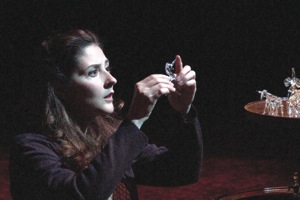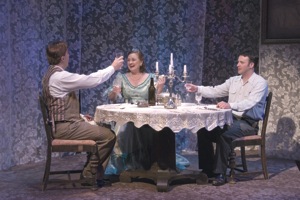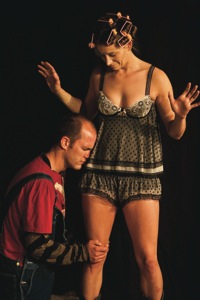-
- Same-sex couples tie the knot in Iowa
- Connecticut passes update of marriage law
- Same-sex marriage foe faces ethics charge
- Library for GLBT books reopens in Fort Lauderdale
- Presbyterians reject gay clergy, but vote closer
- Colorado man convicted of murdering transgender woman
- National News Briefs
- World News Briefs
Theater
An American classic and a minor Shanley
Published Thursday, 30-Apr-2009 in issue 1114
‘The Glass Menagerie’
The bluesy notes of Rik Ogden’s saxophone hang in the air, setting the tone for Tennessee Williams’ great memory play The Glass Menagerie, at Lamb’s Players Theatre.
Set in St. Louis in 1937, The Glass Menagerie was Williams’ breakthrough as a playwright, and it has rightly claimed a place among the most revived plays in the literature. Lyrically and movingly written, this autobiographical play has endeared itself to generations of theatergoers with descriptions such as: “In Spain there was Guernica. But here was only hot swing music and liquor, dance halls, bars and movies, and sex that hung in the gloom like a chandelier and flooded the world with brief, deceptive rainbows.”
That’s Tom Wingfield (Sean Cox) speaking. The 20-something Tom wants lots of things: to write, see the world and have adventures, but mainly to get away from his dead-end job at the warehouse and his mother’s constant haranguing. Tom’s father left years ago – “He was a telephone man who fell in love with long distance” – and Tom has kept food on the family table, but enjoyed not a single minute of it.
The reason Tom persists is sister Laura (Sarah Zimmerman), with a psychological fragility so out of proportion to her limp that she has withdrawn into a fantasy world of glass figurines, the menagerie of the title.
Mother Amanda (Deborah Gilmour Smyth), a faded Southern belle who lives in the memory of the day she received 17 gentleman callers, is wistful about her own past but a bulldog about her hopes for her children, whether they share them or not. The appearance of Laura’s sole gentleman caller, Jim (Jason Heil), will finally make Laura’s future clear to her mother.
The always-reliable Smyth turns in one of the year’s best performances as Amanda, caught between two worlds and struggling mightily to adapt to the realities of her present life. She can be charming, annoying, pathetic or bullying; Smyth embodies them all at the appropriate times.
The fragility of Zimmerman’s Laura will make you ache, especially in the aftermath of her encounter with gentleman caller Jim, the object of Laura’s high school crush. Jim is everything Laura is not – confident, optimistic, a bit egocentric and certain that things will work out in the end – and Heil is utterly convincing.
Cox’s Tom was in and out of phase on opening night. Cox has never disappointed me, but he began the show shouting and seemed to have trouble settling into the rhythm of the narrator’s role. Past experience makes me conclude that he will settle down and do what I know he is capable of.
A special thank you to Rik Ogden, whose wonderfully played atmospheric blues music suits this play so perfectly.
This production of The Glass Menagerie, directed by Robert Smyth, may not be perfect, but there is so much right about it that it should be seen.
The Glass Menagerie plays through Sunday, May 24, at Lamb’s Players Theatre in Coronado. Shows Tuesday through Thursday at 7:30 p.m.; Friday and Saturday at 8 p.m.; matinées Saturday at 4 and Sunday at 2 p.m. For tickets, call 619-437-0600 or visit www.lambsplayers.org.
‘Psychopathia Sexualis’
Playwright John Patrick Shanley, who usually writes about blue-collar New Yorkers trying to connect with each other, is probably best known for his screenplay for the 1987 megahit Moonstruck.
But that huge success was followed by a string of flops, eventually resulting in a full, midlife crisis for the playwright.
Shanley started reading psychiatric literature, was fascinated by Krafft-Ebing’s landmark Psychopathia Sexualis, a series of case studies on Germans with major and minor sexual disorders. He then went on to Jung, and soon found himself boring his friends with psychobabble. At that point, the characters for the 1997 Psychopathia Sexualis began to take shape in his mind.
Psychopathia Sexualis gives us the expat Brit Howard (played with British sangfroid and an astonishingly good accent by James Darvis) and his (self-described) trophy wife Ellie (Brianne Cross). Howard has recently given up his job as manager of a large international stock fund and discovered that retirement does not suit him. He’s been reading Jung and is wont to bore everybody with psychological disquisitions.
The plot gets underway when Arthur (Reed Willard), a nebbishy artist, hesitatingly asks Howard, whom he calls his only friend, to be the best man at his wedding to long, tall Texan Lucille (Frances Rivera), a pretty woman with neither taste nor manners whom Howard describes as “a hillbilly Aztec Evita.”
Howard is taken aback but agrees, only to be apprised of Arthur’s psychological problem: He has a sock fetish and needs to wear them to perform sexually. These aren’t just any socks – they’re his father’s argyles. And Dr. Block (Mark Zweifach), Arthur’s therapist for the past six years, has taken them.
Will Howard get them back from Dr. Block? If not, who can? What will Lucille say when she finds out? Is there any hope for this marriage? Does anyone really care?
Psychopathia Sexualis is minor Shanley: More psychiatric farce than anything, it seems a collection of clever lines rather than a play with content one could chew on after the show.
The Compass production boasts some fine acting; all five actors put more into this script than the writing deserves.
Unfortunately, terrific acting can neither overcome a mediocre script nor disguise ill-conceived design and directorial choices. Amy Peters’ set design is not especially attractive and requires inexcusably long scene changes.
There is no indication in the script that Lucille should sit splay-legged like a cowboy, especially distracting when she wears a short skirt. Likewise, there’s no particular reason her wedding dress should be an impossibly ugly concoction too awful to describe.
Shanley may have been working out his own psychological problems with this minor play. We can only be happy that it seems to have worked for him: His brilliant 2004 Doubt will be remembered long after Psychopathia Sexualis has been forgotten.
Psychopathia Sexualis, directed by Mark Stephan, plays through Sunday, May 24, at Compass Theatre.
Shows Thursday through Saturday at 8 p.m.; matinée Sunday at 2 p.m.
For tickets, call 619-688-9210 or visit www.CompassTheatre.com.
|
|
Copyright © 2003-2025 Uptown Publications





